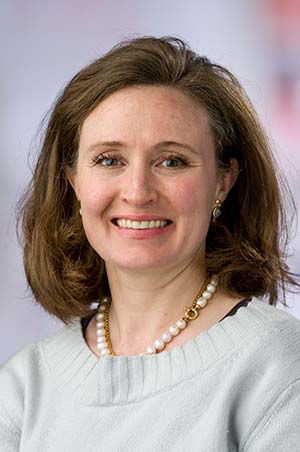Aude G. Chapuis, MD
Associate Professor
Translational Science and Therapeutics Division, Fred Hutch
John C. and Karyl Kay Hughes Endowed Chair
Fred Hutch
Dr. Aude Chapuis is an expert in blood stem cell transplantation and immunotherapy. She cares for patients undergoing these treatments and leads clinical trials of new immunotherapies in which patients receive immune cells called T cells that can detect and destroy diseased cells. In her research laboratory, she and her team investigate the factors that make T cell therapy successful and use that knowledge to develop new immunotherapies that are even safer and more effective. Her ongoing projects are advancing T cell therapies for patients with leukemias or certain solid tumors, including melanoma and Merkel cell carcinoma, another skin cancer.
Other Appointments & Affiliations
Affiliate Investigator, Clinical Research Division, Fred HutchAffiliate Investigator
Clinical Research Division, Fred Hutch
Attending Physician
Fred Hutch Cancer Center
Associate Professor, Department of Medicine
Division of Hematology and Oncology, University of Washington
Education
Lausanne University, Lausanne, Switzerland, Medical School, MD, 1997
Pre-doctoral Research Fellow and Medical Resident, Laboratory of AIDS Immunopathogenesis, University Hospital, Lausanne, Switzerland, 1998-1999, leading to a Medical Doctorate in 2002
Medical Resident, Department of Internal Medicine, Cadolles Cantonal Hospital, Neuchatel, Switzerland, 2000-2001; Department of Internal Medicine, University Hospital, Lausanne, Switzerland, 2001-2003
Medical Resident, Department of Internal Medicine, University Hospital, Lausanne, Switzerland, 2001-2003
Postdoctoral Research Fellow, Fred Hutch, Seattle, WA, 2003-2007
Medical Oncology Fellow, Fred Hutch and University of Washington, 2007-2010
Clinical Expertise
Dr. Chapuis is an Attending Physician on the Autologous and Allogeneic Transplant Services in the Fred Hutch Bone Marrow Transplant Program. She treats patients in both the inpatient and outpatient clinics and consults with patients who are contemplating transplantation. She also attends to patients who receive T-cell infusions in the context of adoptive immunotherapy trials at the Bezos Family Immunotherapy Clinic.
Laboratory Studies
Dr. Chapuis and her laboratory team are engineering T cells with particular T cell receptor (TCR) molecules that bind pieces of specific proteins (antigens) and thereby direct T cells to attack cells expressing those antigens. One TCR-engineered immunotherapy targets Wilms’ tumor antigen 1 (WT1), a cancer-promoting protein that is abnormally expressed in myeloid leukemias and certain solid tumors. Dr. Chapuis recently participated in the identification and generation of a natural (native) high-affinity WT1-specific TCR and led the optimization of clinically-applicable methods for moving the WT1-specific TCR gene into T cells.
The Chapuis team is also advancing other immunotherapies for patients with solid and liquid tumors; these new treatments target tumor antigens with engineered TCRs that confer function to both CD8+ (‘killer’) and CD4+ (‘helper’) T cells, as opposed to more typical CD8+ only protocols. In particular, MAGE-A1 antigen-targeting TCRs are being developed for patients with lung and breast cancers. Another project is focused on developing TCR-based therapies to resolve potentially life-threatening viral infections after stem cell transplantation.
Dr. Chapuis’ translational research laboratory is also discovering novel ways to enhance therapeutic immune responses, including by 1) understanding the factors associated with successful “adoptive” transfer of immune T cells, and 2) developing methods that improve the survival, proliferation and anti-tumor activity of infused T cells. These new findings are in turn used to 3) develop clinical strategies to optimally activate therapeutic T cells to specifically eliminate cancer in patients, without the noxious side effects of chemotherapy.
Current Clinical Studies
Dr. Chapuis has extensive experience in developing state-of-the-art methods for preparing certified T cell products for patients and for monitoring the cells after transfer into patients. She designs adoptive immunotherapy trials aimed at targeting tumor-associated antigens, is the sponsor of multiple successful Investigational New Drug Applications (INDs), by which the Food and Drug Administration (FDA) approves clinical testing of new therapies; and leads approved immunotherapy trials.
Thus far, Dr. Chapuis has tracked and characterized antigen-specific T cells in five clinical trials for patients with HIV, melanoma, Merkel Cell carcinoma or leukemia. In these and other trials, the overall persistence of the transferred T cells has been limited. Therefore, Dr. Chapuis and her laboratory team continues developing new strategies to establish optimal T cell function, including by increasing the tumor-binding strength of TCR molecules that bind specific antigens and direct T cells to attack the antigen-expressing cells. With Dr. Phil Greenberg’s lab, they have developed TCR-engineered Wt1-targeting therapies. Recent trials have enrolled patients with leukemia, or patients with non-small cell lung cancer or mesothelioma.
Collaborating with UW’s Dr. Paul Nghiem, Dr. Chapuis is testing Merkel-Cell polyomavirus-specific T cells for patients with metastatic Merkel Cell Carcinoma., an aggressive skin cancer. The most recent trial evaluated a combination therapy designed to increase the ability of TCR-engineered T cells to find and kill Merkel cancer cells and to help the anti-cancer T cells stay active long enough to eliminate tumors. A follow-on trial (NCT03747484) will soon begin enrolling patients.
"We’re trying to find something which is safe, targets just the tumor, doesn’t involve chemotherapy, hopefully, to make the outcomes better. I think we are really on to something here."
— Dr. Aude Chapuis
